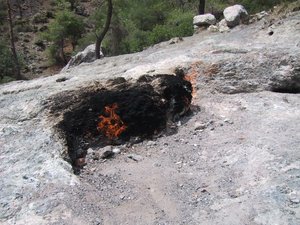Olympos
|
|
Olympos is a common variation of Olympus. This article refers to a town in Greece. For other meanings of Olympus, see Olympus (disambiguation).
Olympos is a town on the south coast of Turkey. It was founded around a river delta. As a member of the Lycian federation, the city was invaded by the Cilician pirates until 78 B.C., ending when it became a part of the Roman Empire. One of the more archaeologically interesting buildings there today is the remains of a temple located west of the river. Remnants of this temple are displayed in the Anatolian Civilizations Museum in Ankara. The people of Olympos built a temple for their most important god, Hephaistos (Vulcan in Roman mythology). One motif at this temple is a perpetual flame, called the chimera. Near Olympos, a flame is seen to come out of the ground. This was interpeted as an incarnation of Hephaistos, and this iconography was inspired by the Hittite civilization.
In the Middle Ages, Venetians, Genoese and Rhodians built fortresses along the coast, but by the 15th century Olympos had been abandoned. Today the site inspires tourism, not only for the artifacts that can still be found (though fragmentary and widely scattered), but also for its scenic landscapes of wild grapevines, flowering oleander, bay trees, and wild figs and pines.

